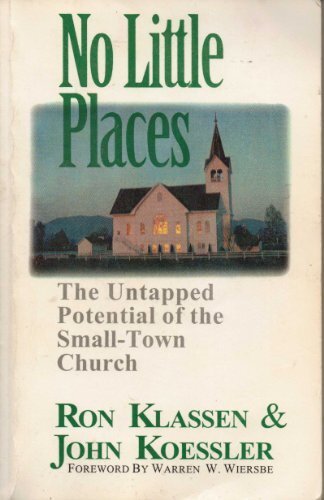Ron Klassen & John Koessler, No Little Places: The Untapped Potential of the Small Town Church. Baker, 1996.
Referenced in: Small Church Leadership
LifeandLeadership.com Summary
Klassen and Koessler are seasoned veterans of small-town ministry. Warren Wiersbe, in the foreword, describes their book as “a heart-to-heart account of cross-cultural evangelism right here in the United States. It’s a primer on how to discover a church’s potential and build on it. It’s a transparent how-to-do-it book that pulls no punches.” What follows is a summary of some of the more helpful sections.
The first section, Struggling With Significance, opens by exposing and countering five myths of small-church ministry success:
- Numbers Myth, countered by the Quality Principle that God is more interested in quality than size
- Big Place Myth, countered by No Little Places Principle that anywhere God calls one is important
- Recognition Myth, countered by Glory of God Principle that the glory should always belong to God and not us
- Career Myth, countered by the Vocation Principle that ministry is a calling, not a career
- Inferiority Myth, countered by Unconditional Love Principle that we derive significance from God’s love for us apart from our performance
Chapter 2 warns against the tendency of small church preachers to always be looking for the “move up” to a better church. They stress that it takes at least five years to build a foundation for effective small church ministry. They also suggest that one should come to terms with what is driving them to succeed and align with a good support group.
The next section, Bridging the Cultural Gap, gives insight on how to address the new “Rurban” realities that mark the declining role of agriculture, the changing growth patterns and demographics of non-farm small towns, and the overall decrease of spiritual values among small town dwellers. The authors also suggest how a “city-dweller” who is called to a rural church may progress through stages as s/he adapts to a rural culture. The stages move from how quaint, to this isn’t just like home, to starting to make sense, to I like it.
Part 3, Building on Small Church Strengths, addresses how to capitalize on the strengths of small churches, such as intimacy and involvement, and minimize the weaknesses. An important step is “niche-hunting,” or determining the special giftedness of one’s congregation by starting with gifts, identifying needs, and experimenting matching gifts with needs. They draw from Sam Walton’s observations on how small business could survive alongside Walmart by doing their own thing better than Walmart can do it and offering things Walmart cannot.
They also discuss the relational style of leadership in small churches. They draw considerably from Lyle Schaller’s church size typologies and the implications for leadership. Churches of 35-40 use informal decision making with that pastor as facilitator of the group, those of 35-90 use a congregational pattern with pastor as initiator, and those of 85-150 use a representative form of government with pastor as initiator and administrator.
This is a great text on leading small-membership churches. It appears in most resource lists on the subject.
From the Publisher
Warren W. Wiersbe says of No Little Places, “You’ll learn a lot about small-town America and the changes occurring in American society today. Written by two seasoned veterans of ministry in small-town America, No Little Places is a heart-to-heart account of cross-cultural evangelism right here in the United States. It’s a primer on how to discover a church’s potential and build on it. It’s a transparent, how-to-do-it book that pulls no punches. It reads like another chapter in the Book of Acts or extra verses in Hebrews 11.”
***For additional information on this resource, including reviews, click the bookstore links. Check the reference at page top or the links below for resource guides on related topics.***
Related Areas
See Other Resources on Small Churches:
See Other Resources on Church Leadership and Renewal:
- Church Leadership and Renewal, Index
- Church Leadership, Theological Foundations, Ecclesiology
- Church Leadership, Philosophical Foundations – e.g. Church Growth, Missional, Emergent, and Other Missionally Responsive Trajectories
- Church Leadership, Practical Foundations – Church Dynamics and Research
- Church Leadership, Practical Foundations – Congregational Culture, Church Identity
- Church Leadership, Practical Foundations – Size Dynamics, Size Transitions
- Church Leadership, Practical Foundations – Research and Case Studies on Effective Churches
- Church Leadership, Special Situations – Small Church Development
- Church Leadership, Strategies for Renewal
See Resources on Over 100 Areas of Ministry Leadership:


